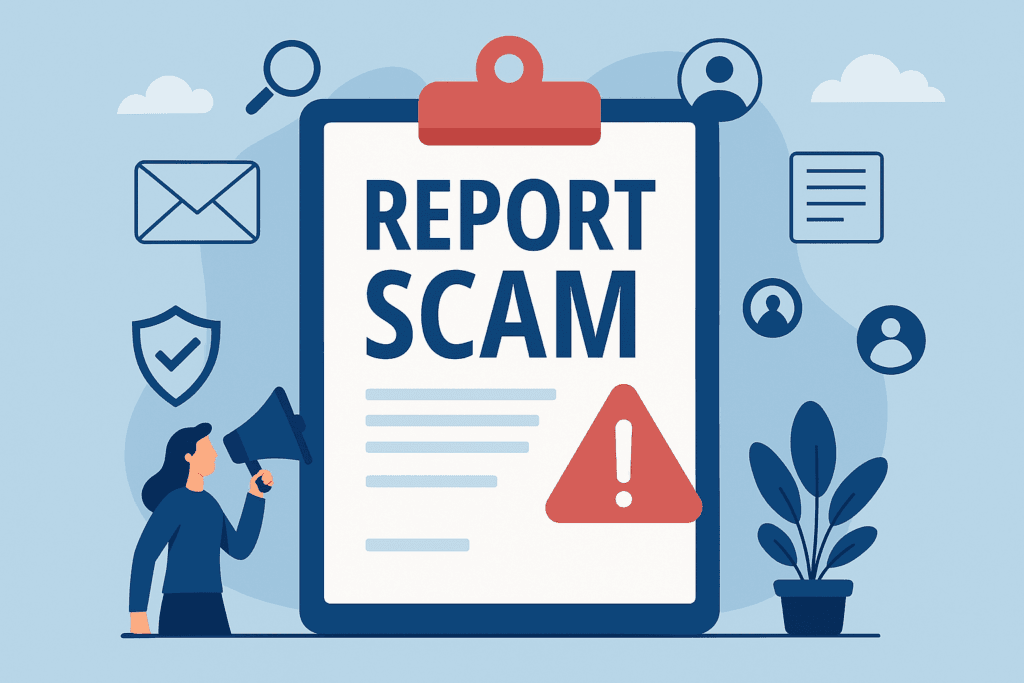
Scams continue to evolve, affecting people from all walks of life across the world. Whether it’s a phishing email, an impersonation scam, or an elaborate financial fraud, it’s vital that victims and witnesses know how and where to report them. Reporting scams not only helps authorities catch the culprits but also protects others from falling into the same traps.
In this blog post, we’ll cover the major types of scams and guide you through reporting them in key countries including the United Kingdom, United States, Canada, Australia, and the European Union. We’ll also include tips on how to recognize and avoid scams.
Why Reporting Scams Matters
- Prevention: Every report helps authorities track scam patterns and alert the public.
- Investigation and Enforcement: Even if your case isn’t individually resolved, your report contributes to building larger investigations.
- Victim Support: Some countries offer support services for scam victims once a report is filed.
Common Types of Scams
- Phishing Emails & SMS (Smishing): Fake messages claiming to be from trusted sources.
- Advance Fee Fraud: Promises of a large sum of money in return for an upfront fee.
- Romance Scams: Fraudsters exploit emotions for financial gain.
- Impersonation Scams: Scammers pretend to be officials from banks, government, or police.
- Investment Scams: Fake opportunities in crypto, stocks, or property promising huge returns.
- Tech Support Scams: Scammers pose as IT professionals to gain remote access or payments.
How to Report Scams in Major Countries
United Kingdom
- Action Fraud (National Reporting Centre for Fraud and Cybercrime)
Website: www.actionfraud.police.uk
Phone: 0300 123 2040 (Mon–Fri, 8am–8pm)
For scams involving immediate threat or crime in progress, call 999. - Scam Reporting Tools:
- Forward scam emails to: [email protected]
- Forward suspicious texts to: 7726 (free spam text reporting service)
United States
- Federal Trade Commission (FTC)
- Report: reportfraud.ftc.gov
- Covers identity theft, telemarketing scams, imposters, and more.
- Internet Crime Complaint Center (IC3)
- Website: www.ic3.gov
- Managed by the FBI for reporting online and cyber-based scams.
- Better Business Bureau (BBB)
- Website: www.bbb.org/scamtracker
- Allows consumers to view and report scams.
Canada
- Canadian Anti-Fraud Centre (CAFC)
- Website: www.antifraudcentre-centreantifraude.ca
- Phone: 1-888-495-8501
- Email: [email protected]
- Reporting Options:
- Report phishing to: [email protected]
- Contact local police for financial fraud or urgent matters.
Australia
- Scamwatch (run by the Australian Competition and Consumer Commission – ACCC)
- Website: www.scamwatch.gov.au
- Submit a scam report: scamwatch.gov.au/report-a-scam
- ACORN (Australian Cybercrime Online Reporting Network)
- Website: www.cyber.gov.au
- For cybercrime and scams involving hacking, identity theft, etc.
- Emergency: For scams with immediate financial loss, contact your bank and report to police.
European Union
- European Consumer Centre Network (ECC-Net)
- Website: www.eccnet.eu
- Supports cross-border consumer complaints within the EU.
- Europol and local law enforcement agencies handle cybercrime and fraud:
- National authorities in each EU country have their own reporting tools.
- Example: France – Pharos platform: www.internet-signalement.gouv.fr
Tips for Reporting a Scam Effectively
- Include all available evidence: Emails, screenshots, sender info, links.
- Never delete scam emails or texts until after reporting.
- Be honest and detailed in your account.
- Update authorities if the scammer recontacts you.
- Report gift card requests as these are common scam payment methods.
Additional Global Reporting Tools
- Google: safebrowsing.google.com – Report phishing websites
- Microsoft: report phishing to: [email protected]
- Apple: Forward suspicious emails to [email protected]
- Meta (Facebook/Instagram): Use in-app report tools or visit www.facebook.com/help
How to Avoid Getting Scammed
- Double-check URLs: Many phishing sites use nearly identical domains.
- Verify through official channels: Contact banks or agencies using publicly listed numbers.
- Don’t share sensitive information via email or phone.
- Don’t pay up-front fees for prizes, jobs, or government money.
- Use security software and keep it updated.
- Educate yourself on common scam tactics via government resources.
Conclusion
Scams are a global threat, but knowledge is power. Reporting scams helps shut them down and informs broader strategies to prevent fraud. Every country has dedicated agencies working to protect consumers and prosecute criminals. Whether you’re in London, New York, Sydney, or Toronto, there are tools available to help you fight back.
Always trust your instincts—if something feels off, it probably is. Don’t hesitate to report a scam. You might just save someone else from becoming a victim.
Stay informed. Stay safe. Stay scam-smart.
Have you been targeted by a scam? Let us know at FraudExpose.com so we can help spread the word and protect others.
